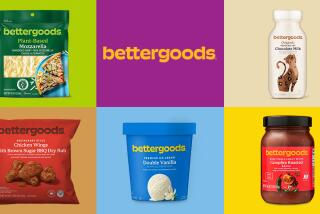No TV Ads : General Foods Woos Upscale Coffee Market
- Share via
Blue waters shimmer in the background. A couple, dressed in crisp summer whites and sharing a wicker lounge chair, are caught in a private moment. “It’s wonderful to get away from civilization,” he says. “I wonder if I can use my credit cards,” she wonders.
Is it an advertisement for clothes or some vacation place? Neither. It’s a magazine ad for coffee. The only sign of the beverage, though, are the coffee mugs the couple hold. Beneath their picture is a small photo of a package of coffee beans.
The low-key approach--no television--is General Foods’ way of introducing its new gourmet coffee line, Maxwell House Private Collection, which it describes as “private coffees for all your private moods.” General Foods is taking a decidedly unusual approach to roll out a highly specialized product like gourmet coffee nationwide.
Bright Spot in Lackluster Field
General Foods hopes to cash in on the growing gourmet or specialty coffee category, which is the only bright spot in an otherwise lackluster coffee market. Karin Brown, product manager for Private Collection, says the gourmet segment of the coffee market has been growing about 20% annually for the past four years.
“If you take a look at all food trends, the public is buying premium goods,” she noted. “It is buying gourmet goods, from coffee to ice cream to beer.”
Until now, the big coffee makers mostly have stuck with regular and instant coffee and with multimillion-dollar television advertising campaigns featuring slogans like “Good to the Last Drop,” “Mountain Grown,” “The Heavenly Coffee” and “Fill It to the Rim.”
And don’t forget Mrs. Olson.
General Foods--the nation’s No. 1 coffee maker with brands such as Maxwell House, Brim, Sanka, Yuban and International Coffees--is introducing Private Collection this fall into about 4,000 of the nation’s 30,000 food stores, she said.
“There have been a lot of companies--at least a half-dozen--that have introduced coffee beans. But this is the first attempt by a mainstream coffee manufacturer like Maxwell House to introduce it into supermarkets,” explained Martin Friedman, editor of New Product News, a monthly Chicago-based newsletter about new products. “The key here is mass market.”
So far, it has been the smaller companies that have been cashing in. For example, the Coffee Bean & Tea Leaf stores, the largest speciality coffee retailer in the Los Angeles, is roasting 8% more pounds of coffee every year, and “we advertise not one penny,” says owner Herbert Hyman.
In contrast, coffee sales overall have been declining for the last 20 years despite the recent introduction of decaffeinated versions of the beverage, according to Robert C. Maxwell Jr., a beverage analyst at the New York brokerage of Furman Selz Mager Dietz & Birney.
“People have been moving away from all hot drinks--be it hot chocolate, coffee or tea--to cold sweet drinks,” explained Maxwell. “It is a life-style decision away from hot drinks to soft drinks.”
He believes coffee companies can overcome consumer malaise over their beverage by raising the quality of coffee, developing coffees to appeal to different tastes and giving coffee a more trendy image, which he says would be a refreshing departure from the traditional pitches by coffee makers.
General Foods is setting out to deliberately create an upscale image for Private Collection. In an unusual marketing campaign, the company is shunning television advertising entirely.
“No TV is unusual for us in a national launch,” Brown admits. Maxwell House typically puts a new product in “every single store we do business in” and backs it up with massive TV advertising.
“With Private Collection, we selected a suggested list of stores where we would immediately be successful,” Brown said.
The company is relying instead on an all-print campaign in magazines such as Newsweek, Time, People, Bon Appetit, Travel and Leisure, Life and Sports Illustrated.
The product’s advertising is directed at affluent young households that typically have incomes of $30,000 to $35,000 and are well educated.
Brown says that this group accounts for the double-digit increases in sales of all premium food categories and that these consumers are more effectively reached by print media.
Friedman at New Product News says, “They (General Foods) probably feel TV is a waste. If they go into a gourmet magazine, they are more likely to be on target. It is the rifle rather than the shotgun approach” to reach their most likely customers. It also comes at a time when national advertisers say they are exploring alternatives to television advertising as it becomes more expensive.
The idea is that Private Collection, sold in whole bean and ground versions, will first attract discerning coffee drinkers.
A major part of selling the brand involves educating consumers about gourmet coffee--the differences in beans and in roasting and brewing methods.
General Foods won’t say how much it is spending on the launch, but the company is using an expensive public relations campaign featuring coffee experts.
Private Collection features eight different coffees with beans from Colombia, Guatemala, Costa Rica and Kenya. It also has two flavored coffees, Touch of Cinnamon and Vintage Amaretto. The recommended price for a 12-ounce bag is about $4.99 to $5.59. That’s about what shoppers pay for a full pound of coffee typically sold in supermarkets.
Speciality coffee retailers like Hyman at the Coffee Bean and Priscilla Silence, owner of Priscilla’s Coffee Co. in Burbank, don’t feel threatened by General Foods. In fact, they welcome the addition.
“It’s good for the overall specialty coffee business,” says Hyman, “There is a drastic difference between what we sell and what someone gets in the supermarket. It makes for a greater awareness of specialty coffee.”
More to Read
Inside the business of entertainment
The Wide Shot brings you news, analysis and insights on everything from streaming wars to production — and what it all means for the future.
You may occasionally receive promotional content from the Los Angeles Times.










